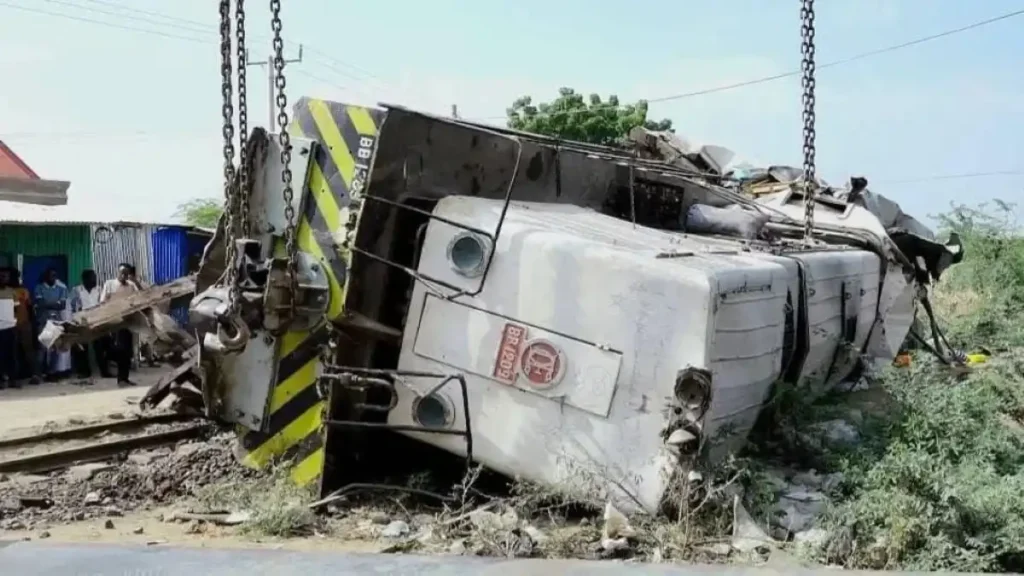In the quiet darkness of eastern Ethiopia, a catastrophic collision shattered lives on October 20, 2025. An overcrowded train, packed with merchants and their goods, slammed into a stationary train near Dire Dawa, a bustling city not far from the Djibouti border.
The crash claimed at least 14 lives and left dozens injured, marking a grim tragedy in a remote region. The merchants were returning from Dewale, their wares filling the carriages, when disaster struck under the cover of night.
The wreckage tells a story of chaos and loss, with twisted metal and scattered belongings painting a haunting scene. For Ethiopia, this accident is a stark reminder of the fragility of its rail network and the human cost of its gaps.
Official Confirmation
Dire Dawa’s mayor, Ibrahim Usman, confirmed the death toll on October 21, sharing a heartfelt statement online. “Our hearts are heavy with grief for those lost,” he wrote, vowing support for the victims’ families.
His words echoed the shock felt across the community, as residents grappled with the scale of the disaster. The mayor’s office is now working to ensure aid reaches those affected, but the road to recovery promises to be long.
The crash’s impact reverberates beyond Dire Dawa, raising alarms about rail safety in a nation reliant on trains for trade and travel.
A Struggle for Rescue
Eyewitnesses described a frantic aftermath, with locals stepping in where systems faltered. Ambulances were scarce, delaying critical care for the injured. Brave residents pulled survivors from the mangled carriages, their hands working through the wreckage to save lives.
“It was chaos,” one witness recalled, “people screaming, trapped, and no help in sight for too long.”
The lack of immediate emergency response amplified the tragedy, leaving communities to shoulder the burden.
Hospitals in Dire Dawa are now treating the injured, many with severe wounds from the violent impact. The scene underscored the region’s stretched resources, a challenge Ethiopia must confront.
A Pattern of Peril
Rail accidents are not new in Ethiopia, where an aging network and heavy loads push infrastructure to its limits. The merchant train, brimming with passengers and goods, was a lifeline for traders crossing to Djibouti.
Yet, overcrowding and potential lapses in maintenance may have set the stage for disaster. While the exact cause remains under investigation, early reports point to the moving train’s failure to stop in time, leading to the deadly collision.
This incident follows other regional tragedies, where overburdened transport systems have buckled under pressure. Ethiopia’s government faces mounting calls to overhaul rail safety and emergency protocols.
A Nation in Mourning
The loss of 14 lives, each a story of ambition and struggle, has left Ethiopia shaken. Families mourn, and survivors face a long road to recovery. The crash exposes deeper issues: outdated tracks, lax oversight, and a dire need for better emergency systems. Dire Dawa, a hub of trade, now carries the weight of this sorrow, as locals rally to support the victims.
Investigations are underway to uncover why the trains collided and why help was slow to arrive. The findings could spur reforms to prevent future heartbreak.
A Call for Action
This tragedy demands more than condolences it cries for change. Ethiopia’s rail system, vital for its economy, must be fortified with modern safety measures.
Faster emergency responses could save lives in remote areas. As Dire Dawa heals, the nation looks to its leaders to act, ensuring no more lives are lost to preventable disasters. The memory of those 14 souls fuels a resolve to build a safer future.
READ ALSO: PSG Thrash Leverkusen 7-2 in Champions League Showdown




















